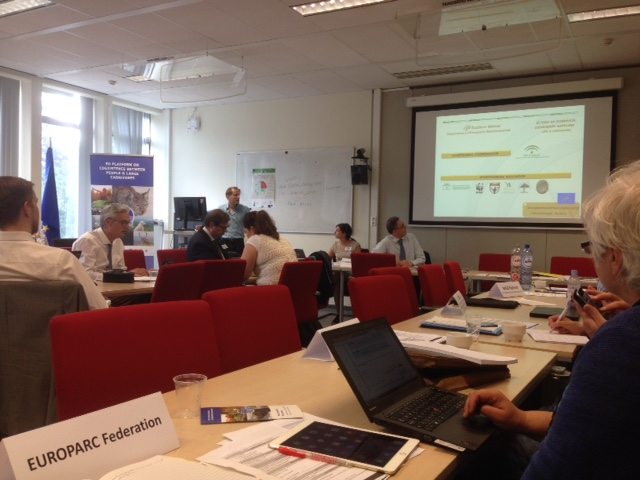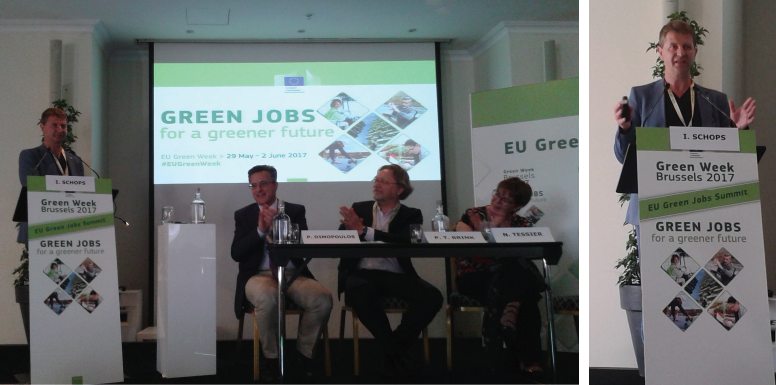EU Large Carnivore Platform meeting: Good practice for coexistence
The Platform was established to “promote ways to minimize and find solutions to conflicts between people and large carnivores”.
Large Carnivore Platform
EU Large Carnivore Platform Plenary Meeting: Sharing good practice for coexistence
EUROPARC and representatives from landowning, herding, hunting, research and conservation organisations, met yesterday in Brussels for the fourth annual meeting of the EU Platform on Coexistence between People and Large Carnivores. During the Plenary meeting, the first since the European Commission adopted the new Action Plan for nature, people and the economy, the members reviewed their work from the previous year and discussed future plans.

The main items on the agenda included:
- a discussion of good practice examples for coexistence with large carnivores based on activities carried out in a range of countries – a report will be launch later in 2017
- statement on recent developments in large carnivore management in Romania (see press release here)
- How to link the work of the local-national platforms to the EU Platform? A number of regional, national and local large carnivore Platforms were invited to the meeting to explore the potentialities of working together.
Humberto Delgado-Rosa, Director for Natural Capital, DG Environment, who co-chairs the meeting for the European Commission, said:
A focus of our new action plan is building political ownership by working together with stakeholders and member states. It’s been interesting to discuss how the EU Platform and national and regional Platforms can work together and share information. There is more potential to establish similar groupings in the Member States where large carnivores are already present or are returning.
Next Large Carnivore Platform Workshop: “Living Together”, organised by EUROPARC and ELO
EUROPARC and ELO (the European Land Owner’s Organisation) are preparing a thematic workshop on Large Carnivores that will take place in Preapli Giulie Nature Park (Italy), between the 12-14 October 2017.
With a multiplicity of perspectives and the background experience of our host in transboundary cooperation (Prealpi Giulie is a Transboundary Park, together with Triglav National Park), the workshop will greatly contribute to finding solutions on how we can “Live together”. More information and the finalised programme will be launched soon.
Further information
The EU Platform on Coexistence between People and Large Carnivores is a grouping of organisations representing different interests groups which have agreed a joint mission: “to promote ways and means to minimize, and wherever possible find solutions to, conflicts between human interests and the presence of large carnivore species, by exchanging knowledge and by working together in an open-ended, constructive and mutually respectful way.”
For more information on the work of the Platform, please see:
http://ec.europa.eu/environment/nature/conservation/species/carnivores/coexistence_platform.htm
EUROPARC at EU Green Week 2017
Green Jobs for a greener future was the thee of the EU Green Week edition of 2017. Between 29th May and 2nd June, hundreds of events were held all over Europe to
put green jobs and skills at the heart of the transition to a circular economy.
On May 31st, EUROPARC President Ignace Schops represented the Federation in the EU Green Jobs Summit, as moderator of the session “Contribution of the EU nature policy to creating new jobs”. Ignace represented the perspective of Protected Areas and shared experiences of EUROPARC members.

Ignace Schops at the EU Jobs Summit, EU Green Week 2017, Brussels
During the session, a new scoping study on Natura 2000 and jobs, as well as other recent activities in the EU were presented. The highlight was the role of Natura 2000 and the protection of biodiversity while creating employment, related either directly to conservation and restoration measures and sustainable production activities; or to the indirect use of natural capital in a range of sectors such as tourism, recreation, health, and education.
Download the full programme here.